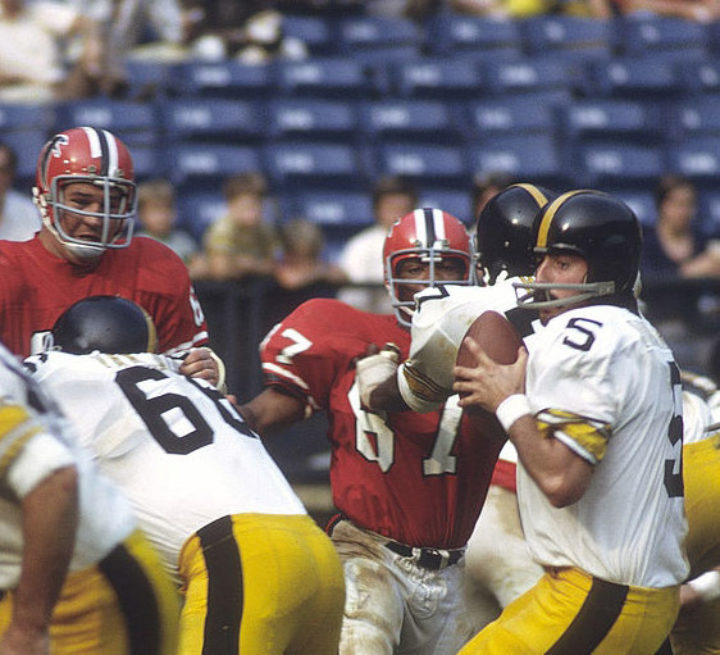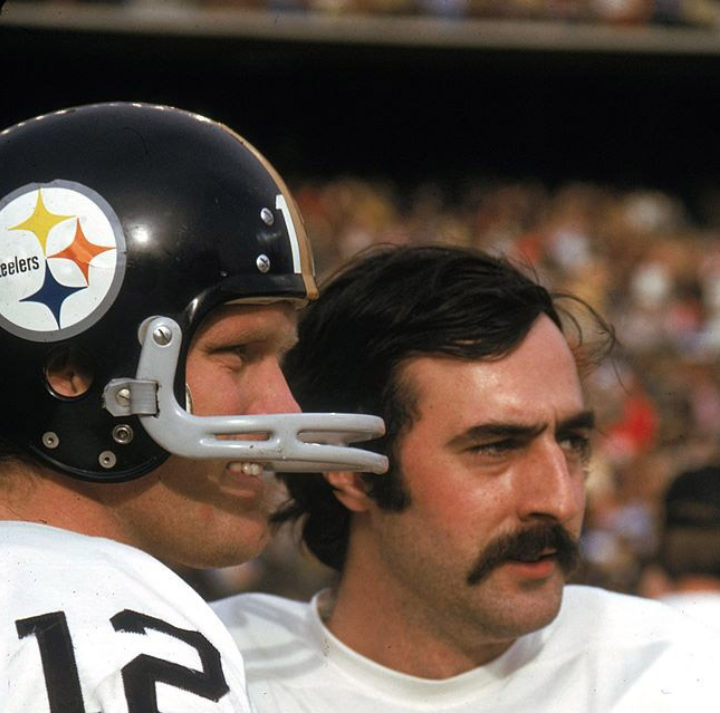I played eight years in the pros, plus grade school, high school, and college. That’s a lot of time on the field. During my time in the league, you didn’t make the kind of money they do today, where putting in another year can set you up financially for another 10 years. I had to really consider, ‘Do I want to keep doing this, or do I want to jump into the real world?’ Football is not a profession, it’s something you do for X amount of time. Usually, football tells you when to leave, you don’t just leave it.
Terry Hanratty
Terry Hanratty is a former NFL vet who played from 1969-1976. He earned two Super Bowl rings as a backup QB for the Pittsburgh Steelers. After the game, he worked several decades on Wall Street and is still involved in investing today.
“ Football is not a profession, it’s something you do for X amount of time. Usually, football tells you when to leave, you don’t just leave it. ”

I was fortunate, and in a place where I didn’t want to play anymore. I had been with great teams, through ups and downs, so it was time to try something new. Even though I didn’t want to play football anymore, it was a very difficult transition being away and separated from football. It was such a big part of my life for twenty years. I retired at 29 because I didn’t want to be in my late 30’s having to jump into the real world again.
“ Even though I didn’t want to play football anymore, it was a very difficult transition being away and separated from football. ”
I was an economics major at Notre Dame. I enjoyed the stock market and invested while I was playing. I knew that was the area I wanted to get into. I got into the brokerage business and ended up working about 30 years on Wall Street. I was what they called a trader. If you see the madness on television and the people on the floor yelling and screaming at one another buying and selling stocks, a trader is the semi-sane person telling them what to do.
Being a trader was similar to being a quarterback. In both positions, you have seconds to make decisions. On Wall Street we traded big blocks of stock - millions and millions of shares. It was a good transition for me, because I was used to making quick decisions and having to live with them. You’re not always right – whether it be an interception or whether it be a bad trade – so you live with the decision’s outcome and go do it all over again.
“ Being a trader was similar to being a QB...whether it be an interception or whether it be a bad trade...you live with the decision’s outcome and go do it all over again. ”
I'm retired from my five o'clock wake ups, but I still dabble in investing. I raise money for hedge funds, which is fun and interesting. It keeps me busy and is something I don’t have to do on a daily basis – I get to pretty much do it when I want to which is awful nice.
There’s no better example of support and teamwork than football. There comes a time where you have to step away from football - whether it’s grade school, high school, college, or pros - it doesn’t last forever. In that 9-to-5 atmosphere, you’ll still be a part of a team. The people who succeed are the people able to blend in, get along with people, and work as a team. Football teaches you that more than any other sport.
“ The people who succeed are the people able to blend in, get along with people, and work as a team. Football teaches you that more than any other sport. ”

I wish I would have mingled more with professional people. I think I probably waited a little too long to do that. You fall into the thought that football will never end. You think you’re invincible, and that mindset gets into your normal day-to-day life. One day, boom, it’s over and you say, ‘But I didn’t mean for it to end this way.’
I would tell other players to take every meeting available because something one day will make them think, ‘Wow, that really interests me.’ You never know what it’s going to be, so throw yourself into those meetings and programs available to you. Transitioning is such a great time to expose yourself to those types of atmospheres where you can network.
“ Transitioning is such a great time to expose yourself to those types of atmospheres where you can network. ”
In the cities you played in, the executives of every corporation would like to meet you. Set up an appointment and go meet them. Utilize owners of teams you played for, because they may know those CEO or CFOs personally. Dive into your community. Someone somewhere along the way will say, ‘Hey so-and-so, why don’t you come work for me.’ That could be the start of your new career.
J.R. Wilburn, a former teammate of mine at the Steelers asked me, ‘Have you seen anything about The Trust?’ I told him no and asked what it was. After he explained it, I ended up getting in contact with my Program Specialist, Krystal Woods. We had a great conversation, and I got enrolled.
It was a wonderful experience. The Trust paid for my airfare, the hotel, they give you a per diem, they pick you up at the airport with car service, etc. At the end you receive a great write-up. Before I attended the Milestone Wellness Assessment at UNC, I had hurt my ears. I was doing target practice with a buddy and did not use my regular ear protectors. When filling out forms for the assessment, it asked if I wanted the doctors to look at anything not listed. I put down I was having problems with my hearing, so they brought in the No. 1 ENT doctor in the world.
The doctor came into the room after my test and said, ‘Terry, you need hearing aids.’ I replied, ‘No way.’ He was adamant and told me, ‘Wait a minute, let me put it to you this way. There’s a correlation between loss of hearing, not doing anything about that loss of hearing and dementia.’ It was like he hit me with a hammer. I have my hearing aids in right now and it makes a world of difference. I’m choosing to use this as a preventative measure against dementia. It was an eye-opener and it’s all because of The Trust. The Trust elongated my life because of what they helped me find with my hearing. It opened my eyes to taking care of myself and doing everything I can to prevent something drastic from happening to me. They really care about you.
“ It was an eye-opener and it’s all because of The Trust...They really care about you. ”
The Trust is here to support you.
Ready to learn how?
Related Spotlights
Darryl Blackstock
How Darryl Blackstock Used The Trust to Take His Future Into His Own Hands